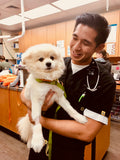In today’s allergy series, we are going to talk about food allergies for pets. To start off, let’s review what allergies are. Allergies are an abnormal, over-reactive, hypersensitive response of the immune system to certain, normally harmless, substances, called allergens. The over-reaction of the immune system to allergens causes cells of the body, called Mast Cells, to release chemicals that cause inflammation such as: redness, swelling, and itching. Thus, signs of allergies in dogs most often manifest as local or generalized itching of the skin, although sometimes signs of coughing, sneezing, and diarrhea can occur as well. Many factors play into the development of allergies in dogs, including genetics, environment, and diet. Unfortunately, allergies are quite common in dogs and can affect dogs of all breeds, ages, and backgrounds.
What are Food Allergies?
Food allergies can develop to almost any protein or carbohydrate component of food. Most pet foods on the market include a variety of processed food proteins and carbohydrates. Food allergies most commonly develop in response to protein in the food. Dairy products, beef, chicken, eggs, and soy are commonly associated with food allergies in dogs. Allergic reactions to food commonly develop when genetically allergy-prone pets are repeatedly exposed to large amounts of proteins over time.
What are Signs of Food Allergies?
It’s important to recognize potential signs of food allergies when they start to develop. Food allergies can develop at almost any age and can cause many of the signs previously discussed including itching, paw biting, ear scratching, head shaking, and digestive disorders. Most pets that present to the veterinary clinic with food allergies come exhibit ear infections and extremely irritated paws. However, oftentimes an allergic dog may have multiple types of allergies, such as both food and environmental allergies, making the exact diagnosis of a dog’s skin allergies quite challenging.
How to Diagnose Food Allergies?
To best figure out what your pet is allergic to, it is important to have a complete list of all the foods and treats that you are currently feeding or have previously fed your pet, including non-pet food items, such as table scraps and treats. The most accurate way to test for food allergies is with an elimination diet trial using novel or hypoallergenic diet as recommended by your veterinarian. These diets are specifically designed with restricted protein and carbohydrate sources. They may also contain fatty acids to reduce the itching and improve the skin. It takes at least 8 weeks for all other food proteins to be eliminated from the body, so your pet must eat the special diet exclusively for a 2-month period. If improvement of your pet’s clinical signs occurs, this is a positive response and means that your pet has an allergy to a previously regularly fed protein. It is important to emphasize that the elimination diet trial must be EXCLUSIVELY novel or hypoallergenic, which means the removal of all table food, treats, and flavored vitamins. Otherwise, the test will prove invalid. This test may be repeated multiple times until the right protein diet for your pet is found.
How to treat Food Allergies?
Just like in people, there is no real cure for allergies. Eliminating the offending protein or allergen is the only truly effective treatment. However, there several ways to treat, manage, and minimize the effects of food allergies during the elimination trial to figure out the offending allergen. Anti-itch medications can be given in oral or injectable form to stop irritation and damage to the skin. In addition, topical medications in the form of shampoos, sprays and ointment can work directly at the site of skin infection/irritation. Food allergies do not typically respond as well to corticosteroid treatment as other allergies and seeing persistent itching and irritation despite steroid medication may help point us in the direction of food allergies.
I hope this blog post helps answer your questions about food allergies in our pets. If you suspect your pet has food allergies, please visit your local veterinarian. We understand that food allergies can be a frustrating condition for you and your fur-babies and we’re here to help. Our conventional and holistic skin support supplements include a multitude of novel protein anti-inflammatory, anti-itch components to help provide additional relief to your pet’s itch and keep their coat healthy and beautiful. Otherwise, please feel free to reach out to our team on Facebook, Instagram, e-mail, or in the comments section if you have any other questions.
About the Author:
 Dr. Zonram Liao D.V.M. is a Southern California native, and earned his undergraduate degree from University of California, San Diego before obtaining his veterinary degree from Ross University School of Veterinary Medicine. He is not only a firm believer in the use of supportive care supplements to improve the health and happiness of his patients, but also is a strong advocate of the benefits of preventive care medicine for his patients as well. During his free time, Dr. Liao enjoys spending his time outdoors fishing and hiking, playing basketball, watching movies, cooking, traveling, and trying new foods.
Dr. Zonram Liao D.V.M. is a Southern California native, and earned his undergraduate degree from University of California, San Diego before obtaining his veterinary degree from Ross University School of Veterinary Medicine. He is not only a firm believer in the use of supportive care supplements to improve the health and happiness of his patients, but also is a strong advocate of the benefits of preventive care medicine for his patients as well. During his free time, Dr. Liao enjoys spending his time outdoors fishing and hiking, playing basketball, watching movies, cooking, traveling, and trying new foods.

